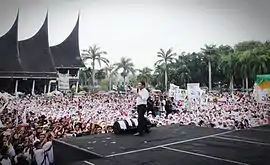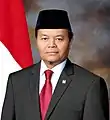Prosperous Justice Party Partai Keadilan Sejahtera | |
|---|---|
 | |
| Abbreviation | PKS |
| Leader of the Sharia Assembly | Salim Segaf Al-Jufri |
| President | Ahmad Syaikhu[1] |
| Secretary-General | Aboe Bakar Al-Habsyi |
| Founded | 20 July 1998 (as Partai Keadilan) 20 April 2002 (current name) |
| Headquarters | Jakarta |
| Ideology | |
| Political position | Third Way, Right-wing to far-right |
| National affiliation | Coalition of Change |
| International affiliation | Muslim Brotherhood |
| Slogan | Bersama Melayani Rakyat (Together Serving the People) |
| Ballot number | 8 |
| DPR seats | 50 / 575 |
| DPRD I seats | 191 / 2,232 |
| DPRD II seats | 1,229 / 17,340 |
| Website | |
| www | |
The Prosperous Justice Party (Indonesian: Partai Keadilan Sejahtera, sometimes called the Justice and Prosperity Party), frequently abbreviated to PKS, is an Islamist[3][10] political party in Indonesia.
PKS is a metamorphosis from the Justice Party (Indonesian: Partai Keadilan, PK) established in 1998.[3] The party was originally influenced by the Muslim Brotherhood movement of Egypt, and considered an Islamist party for its calls for Islam to play a central role in public life,[11] as well as providing political support to Indonesian and international Islamist movements such as the Islamic Defenders Front[12] 212 Movement. Today, it is considered a nationalist Islamist party that conforms with Pancasila doctrine and no longer upholds sharia as a main goal.[3][10][13][14]
In 2019, the party obtained the popular vote by 8.21 percent, which is greater than 6.79 percent in 2014 and 7.88 percent in 2009. The party is currently led by Ahmad Syaikhu.[1]
History


The origin of the party is a religious movement known as Jemaah Tarbiyah, which was influential in university campuses during the 1980s and 1990s. Activists of Jemaah Tarbiyah established the Justice Party, the predecessor of the party on 20 July 1998, with Nurmahmudi Ismail as its first president.[5] The Justice Party was reconstituted as the Prosperous Justice Party in April 2002 after the Justice Party failed to meet the required two percent of electoral threshold in the 1999 election that it needed to contest the 2004 election. During the 2004 legislative elections, the PKS won 7.3% of the popular vote and 45 out of 550 seats, making it the seventh-largest party in parliament. This was a gain from the 1.4% received in 1999. In addition, its leader Hidayat Nur Wahid was elected speaker of the People's Consultative Assembly. PKS's strongest support is in major urban centers, particularly Jakarta, where it won the largest share of seats in 2004. In the 2009 elections, the party's came fourth, its share of the vote rose to 7.88% and it gained 12 extra legislative seats.[15]
The PKS is known for its public opposition to political corruption; this stance was widely reported as a major factor in the party's increased success in 2004. However, this image has been under attack in recent times, as several alleged cases of grafts are suspected to be connected to several prominent party politicians.[16][17][18] The party is closely associated with Islamic teachings, but according to its leadership does not promote the mandatory implementation of sharia, requiring Indonesia's Muslims to follow Islamic law.[19] Many of its campaigns are based on conservative religious teachings, such as opposition to the selling of pornography,[20] and for strict punishments for violations of narcotics laws.[21]
The party has been associated with the Egypt-based Muslim Brotherhood; several of its founders attended Brotherhood-related schools.[11] The organization stages rallies supporting Hamas in its conflict with Israel, and against the influence of the United States both in the Middle East and in Indonesia.[22]
After the 2004 Indian Ocean tsunami, PKS sent volunteer relief workers to Aceh,[23] and has been involved in several other relief and reconstruction projects.
Over the years, the party has experienced prolonged internal rivalry, particularly between camps that can be identified as pragmatist on the one hand, and idealist on the other. The pragmatist camp has generally been made up of younger, secular-educated functionaries while older functionaries who often are graduates from institutes in the Middle East make up the idealist camp.[24]
The 5 October 2011 edition of Indonesian TV news program Liputan 6 Petang reported PKS Deputy Secretary-General and member of Indonesia's House of Representatives Fahri Hamzah had recently floated the idea of disbanding Indonesia's Corruption Eradication Commission (Komisi Pemberantasan Korupsi or KPK).[25][26] According to Kompas, Deputy Chairman of Commission III in House of Representatives was responsible for legal affairs, human rights and security Fahri Hamzah first made the suggestion to disband the Corruption Eradication Commission in a consultation meeting at the House on Monday 3 October 2011.[27]
The party saw rapid successions of party presidents in the 2010s. In 2013, Lutfi Hasan Ishaaq was arrested by the Corruption Eradication Commission due to graft; Anis Matta was chosen to replace him as party president and finally, Taufik Ridho succeeded Matta as secretary general. Taufik Ridho died of medical complications on 6 February 2017 at 52 years of age.[28]
After rejecting State Capital Act (UU IKN) and the Criminal Offense Bill of Sexual Abuses (RUU TPKS) in 2021 and 2022 as well as supporting Suharto as National Hero in 2008, the some members of the public called for the dissolution of PKS.[29]
Party platform
The party's vision is to bring about a civil society that is just, prosperous and dignified.[30]
Its mission is to:
- Pioneer reforms to the political system, government and the bureaucracy, the judicial system and the military to be committed to strengthening democracy.
- Address poverty, reduce unemployment and improve the prosperity of all elements of society through a strategy to equalize incomes, high value-added growth and sustained development.
- Move towards just education by providing the maximum possible opportunities for all the Indonesian people.
Party figures

 Hidayat Nur Wahid, former president of the Prosperous Justice Party and former chairman of the People's Consultative Assembly.
Hidayat Nur Wahid, former president of the Prosperous Justice Party and former chairman of the People's Consultative Assembly. Irwan Prayitno, former governor of West Sumatra.
Irwan Prayitno, former governor of West Sumatra. Ahmad Heryawan, former governor of West Java.
Ahmad Heryawan, former governor of West Java. Mahyeldi Ansharullah, governor of West Sumatra.
Mahyeldi Ansharullah, governor of West Sumatra. Tate Qomarudin, Member of the Regional People's Representative Council of West Java Province for three terms.
Tate Qomarudin, Member of the Regional People's Representative Council of West Java Province for three terms.
Election results
Legislative election results
| Election | Ballot number | Total seats won | Total votes | Share of votes | Outcome of election | Party leader |
|---|---|---|---|---|---|---|
| 1999 | 24 | 7 / 500 |
1,436,565 | 1.36%[31] | Opposition (2001–2004) |
Nur Mahmudi Ismail |
| 2004 | 16 | 45 / 550 |
8,325,020 | 7.34%[32] | Hidayat Nur Wahid | |
| 2009 | 8 | 57 / 560 |
8,204,946 | 7.88%[32] | Tifatul Sembiring | |
| 2014 | 3 | 40 / 560 |
8,480,204 | 6.79%[33] | Anis Matta | |
| 2019 | 8 | 50 / 575 |
11,493,663 | 8.21%[34] | Sohibul Iman | |
| 2024 | 8 | Ahmad Syaikhu |
Presidential election results
| Election | Ballot number | Candidate | Running mate | 1st round (Total votes) |
Share of votes | Outcome | 2nd round (Total votes) |
Share of votes | Outcome |
|---|---|---|---|---|---|---|---|---|---|
| 2004 | 3 | Amien Rais | Siswono Yudo Husodo | 17,392,931 | 14.66% | Eliminated |
Runoff | ||
| 2009 | 2 | Susilo Bambang Yudhoyono | Boediono | 73,874,562 | 60.80% | Elected |
|||
| 2014 | 1 | Prabowo Subianto[35] | Hatta Rajasa | 62,576,444 | 46.85% | Lost | |||
| 2019 | 02 | Prabowo Subianto | Sandiaga Uno | 68,650,239 | 44.50% | Lost | |||
| 2024 | 01 | Anies Baswedan | Muhaimin Iskandar | ||||||
Note: Bold text suggests the party's member
See also
Notes
- ↑ A 2008 Lowy Institute for International Policy paper suggests that Prosperous Justice Party of Indonesia is post-Islamist.[7]
References
- 1 2 "Salim Segaf Ketua Majelis Syuro, Sohibul Iman President PKS" (in Indonesian). CNN Indonesia. 10 August 2015.
- ↑ Geraldy, Galang (2019). "Ideologi dan Partai Politik: Menakar Ideologi Politik Marhaenisme di PDIP, Sosialisme Demokrasi di PSI dan Islam Fundamentalisme di PKS". Politicon: Jurnal Ilmu Politik. www.neliti.com. 1 (2): 134–157. doi:10.15575/politicon.v1i2.6268. S2CID 213924604. Retrieved 1 July 2022.
- 1 2 3 4 Al-Hamdi, Ridho. (2017). Moving towards a Normalised Path: Political Islam in Contemporary Indonesia. JURNAL STUDI PEMERINTAHAN (JOURNAL OF GOVERNMENT & POLITICS). Vol. 8 No. 1, February 2017. p.53, pp.56-57, p.62.
- ↑ Hamayotsu, Kikue (September 2011). "The Political Rise of the Prosperous Justice Party in Post-Authoritarian Indonesia: Examining the Political Economy of Islamist Mobilization in a Muslim Democracy". Asian Survey. 51 (5): 971–992. doi:10.1525/as.2011.51.5.971. JSTOR 10.1525/as.2011.51.5.971.
- 1 2 Yon Machmudi (November 2008). Islamising Indonesia: The Rise of Jemaah Tarbiyah and the Prosperous Justice Party (PKS). ANU Press. doi:10.22459/II.11.2008. ISBN 9781921536243.
- ↑ Mohamad Ramadan Habibi; Noor Naemah Abd Rahman; Kamaruzzaman Bustaman Ahmad. "PROSPEROUS JUSTICE PARTY (PKS) IN THE INDONESIAN MASS MEDIA". academia.edu.
- ↑ Bubalo, Fealy & Mason 2002, p. 51, 76.
- ↑ "Indonesia's Political Parties". Carniege. Retrieved 5 November 2021.
- ↑ Alexander R. Arifianto; Leonard C. Sebastian; Syafiq Hasyim (29 October 2020). Rising Islamic Conservatism in Indonesia Islamic Groups and Identity Politics. Taylor & Francis. pp. 172–173. ISBN 978-1-000-20536-7. Retrieved 5 November 2021.
- 1 2 Al-Hamdi, Ridho. (2013). Partai politik Islam: Teori dan praktik di Indonesia. Yogyakarta: Graha Ilmu.
- 1 2 Dhume, Sadanand (1 December 2005). "Indonesian Democracy's Enemy Within". YaleGlobal Online. Archived from the original on 13 April 2009.
- ↑ "PKS: Pembubaran FPI, Langkah Mundur Cederai Reformasi". www.cnnindonesia.com. 2020. Retrieved 3 November 2021.
- ↑ Ufen, Andreas. (2009). Political parties and democratization in Indonesia, in Marco Bünte and Andreas Ufen (Eds.), Democratization in post-Suharto Indonesia. London and New York: Routledge. pp.160-168.
- ↑ Priamarizki, Adhi. (2013). Indonesia’s national elections: Islamic parties at the crossroads, RSIS Commentaries, No. 005 (9 January), pp. 1-2.
- ↑ "KPU Ubah Perolehan Kursi Parpol di DPR (KPU Changes Allocations of Parties' seats in the DPR)". Indonesian General Election Commission (in Indonesian). 14 May 2009. Archived from the original on 6 October 2014.
- ↑ Hasyim Widhiarto; Rendi Akhmad Witular (28 March 2011). "Alleged cases of graft shaking up ostensibly clean PKS". Jakarta Post.
- ↑ "Diduga Korupsi, Sejumlah Petinggi PKS Dilaporkan ke BK DPR". MetroTVNews.com (in Indonesian). 17 March 2011. Archived from the original on 9 October 2011.
- ↑ Taufik Hidayat (27 March 2011). "Isu Poligami & Korupsi Menggembosi Dukungan PKS". Okezone.com (in Indonesian). Archived from the original on 22 March 2012.
- ↑ Indonesia: Islamic party not to implement Shari'ah "strictly" if elected. BBC Monitoring Asia Pacific, 3 May 2006.
- ↑ "Alliance fails to coax PKS on porn bill". Jakarta Post. 8 July 2006.
- ↑ Gov't urged to execute convicted drug traffickers on death row soon. Antara 22 March 2005
- ↑ "Parties protest Israeli attack". Jakarta Post. 17 July 2006. Archived from the original on 12 September 2017. Retrieved 11 September 2017.
- ↑ Nakashima, Ellen (14 January 2005). "Indonesian Islamic party reaps rewards of goodwill". Washington Post.
- ↑ Muhtadi, Burhanuddin (2012). Dilema PKS: Suara dan Syariah (in Indonesian). Jakarta, Indonesia: Kepustakaan Populer Gramedia (KPG). p. 335. ISBN 978-979-9104-38-0. Archived from the original on 10 March 2016.
- ↑ "Anis Matta: Jangan Sentimentil Tanggapi Fahri Hamzah". detikNews (in Indonesian). 5 October 2011.
- ↑ "Fahri Hamzah: KPK Harus Jaga Omongan (Fahri Hamzah: KPK has to watch what it says)". fahrihamzah.com (in Indonesian). 4 October 2011. Archived from the original on 25 April 2012.
- ↑ "Burhanuddin: Fahri "Blunder" jika Ingin Bubarkan KPK (Burhanuddin: Fahri made a blunder by suggesting KPK be disbanded)". Kompas (in Indonesian). 5 October 2011.
- ↑ "Former PKS secretary general dies at 52". Jakarta Post. 6 February 2017.
- ↑ "Bubarkan PKS, Ada Apa dengan Warganet? Ini Kronologinya". Portal Jepara.com. 21 January 2022. Retrieved 21 January 2022.
- ↑ "Falsafah Dasar Perjuangan dan Platform Kebijakan Pembangunan PKS (Basic Philosophy and Development Policy Playform of the PKS)". PKS official (in Indonesian). 28 May 2013.
- ↑ "Pemilu 1999 - KPU" (in Indonesian). Komisi Pemilihan Umum Republik Indonesia. 21 February 2008. Archived from the original on 27 April 2020. Retrieved 1 August 2018.
- 1 2 "Bab V - Hasil Pemilu - KPU" (PDF) (in Indonesian). Komisi Pemilihan Umum Republik Indonesia. Retrieved 1 August 2018.
- ↑ "KPU sahkan hasil pemilu, PDIP nomor satu" (in Indonesian). BBC. 10 May 2014. Retrieved 1 August 2018.
- ↑ Zunita Putri (21 May 2019). "KPU Tetapkan Hasil Pileg 2019: PDIP Juara, Disusul Gerindra-Golkar". Detik.com (in Indonesian). Retrieved 31 May 2019.
- ↑ Wardah, Fathiyah (19 May 2014). "6 Parpol Dukung Pasangan Prabowo-Hatta dalam Pilpres". Voice of America Indonesia (in Indonesian). Retrieved 1 August 2018.
